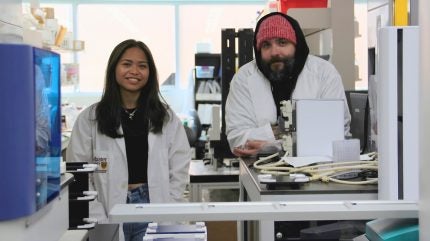
Researchers from Canada’s McMaster University and the Massachusetts Institute of Technology in the US have discovered a new antibiotic to treat inflammatory bowel diseases (IBD).
The researchers also utilised a new type of AI to predict the antibiotic’s mechanism of action (MOA) – the first instance of its kind globally.

Discover B2B Marketing That Performs
Combine business intelligence and editorial excellence to reach engaged professionals across 36 leading media platforms.
Discovered at McMaster, the new antibiotic, which is called enterololin, presents a potential new therapy for individuals living with Crohn’s disease and other related conditions.
The narrow-spectrum drug targets a specific group of pathogens, the Enterobacteriaceae family, which includes harmful E coli strains.
This approach not only eliminates the disease-causing bacteria but also minimises the risk of drug-resistant variants taking hold in the gut.
According to McMaster’s Department of Biochemistry and Biomedical Sciences assistant professor Jon Stokes, MOA trials are crucial yet time-consuming and costly. Using AI, his team was able to carry out enterololin’s trial in six months at a cost of C$60,000 ($43,030).

US Tariffs are shifting - will you react or anticipate?
Don’t let policy changes catch you off guard. Stay proactive with real-time data and expert analysis.
By GlobalDataThe collaboration with MIT’s Computer Science and AI lab (CSAIL) was instrumental in this process.
AI provided a prediction in 100 seconds, suggesting that the drug targets the LolCDE protein complex, vital for the specific bacteria’s survival.
While the AI’s prediction required validation through traditional lab studies, it significantly narrowed down the research focus and accelerated the discovery process.
Stokes stated: “AI has expedited the rate at which we can explore chemical space for new drug candidates, but, until now, it has done little to alleviate a major bottleneck in drug development, which is understanding what these new drug candidates actually do.”
The subsequent lab investigations, spearheaded by McMaster graduate student Denise Catacutan, confirmed the accuracy of the AI prediction.
Stokes continued: “Currently, we can’t just assume that these AI models are totally right, but the notion that it could be right took the guesswork out of our next steps.”
Stokes emphasises that AI is a tool to aid in the drug discovery process, not an end in itself.
His spin-out company, Stoked Bio, has licensed enterololin and is refining the drug for human use at present.
The company is also exploring modified versions of the antibiotic to combat other drug-resistant bacteria.




